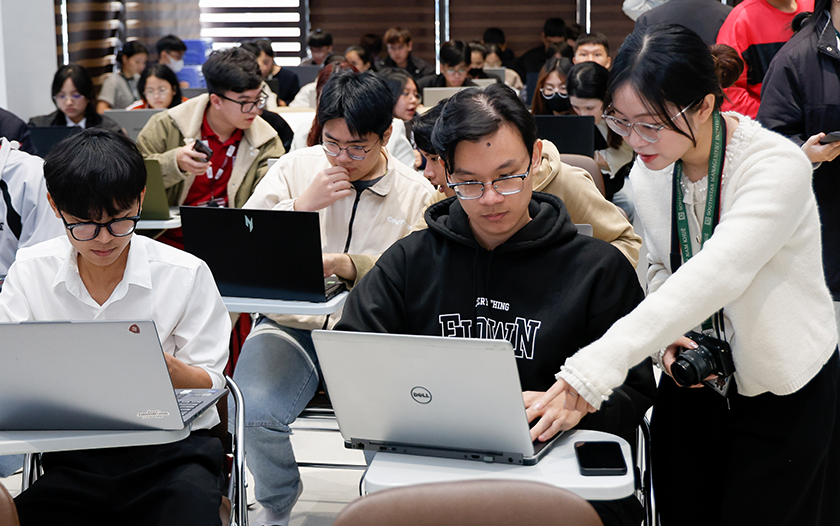On the morning of November 22, 2025, the DTU Business Intelligence Center held the launch ceremony for the training and practice part of the DTU ERPsim League (DEL) 2026 contest. This marks the beginning of a professional academic playground where students can apply the knowledge they learned in a simulated business environment using the SAP ERP system (SAP S/4HANA), in the context of a strong digital transformation.

Mr Le Cao Duy, a research specialist at the BIC, introduced the DTU ERPsim League 2026
The DTU ERPsim League 2026, organized by the DTU Business Intelligence Center (BIC), is an annual academic playground where students gain practical exposure to enterprise operations through simulations on the SAP ERP system (SAP S/4HANA). The competition enables students to apply what they have learned in a simulated business environment, test management tactics, make strategic decisions, and directly observe how those decisions impact business performance.
Earlier, at the ERPsim International Competition 2025, DTU’s team Dongry Corporation was outstandingly crowned world champion, affirming the capabilities and spirit of DTU students on the global stage.

BIC specialists guided students toward a better understanding of how the simulation system operates
The DTU ERPsim League 2026 is more than a simulation game. It offers students a chance to:
- gain an in-depth understanding of how to run a business, from procurement, sales, inventory management, and production to finance,
- develop strategic decision-making skills under time pressure, as business indicators continuously change with each simulation round,
- build proficiency in the SAP ERP system, one of the world’s leading ERP platforms and widely adopted by multinational corporations as well as small and medium-sized enterprises (SMEs).
From one competition round to the next, students can experiment with strategies, make investment decisions, optimize resources, and immediately observe how those decisions affect the performance of the simulated business.
The DTU ERPsim League 2026 attracted nearly 150 students from various economics, management, and engineering majors from:
? the Faculty of Business Administration,
? the Faculty of Marketing,
? the Faculty of Finance & Economics,
? the SouthStar Management Institute,
? the International School,
? the School of Computer Science,
? the ADP program.
The competition runs for five months (scheduled from December 2025 to April 2026), following a well-structured roadmap that gradually increases in complexity. This allows students to gradually master the system and simulation content. There are three ranks, corresponding to the breadth and depth of the business processes:
1. Rank C: Maple introduction game
This is the introductory level, focusing on fundamental business processes such as demand planning, procurement, sales, warehouse & inventory management, and financial management. At rank C, students practice reading and interpreting data, analyzing reports, and making quick decisions in a competitive environment. This gives them a firm understanding of core business operations.
2. Rank B: Manufacturing extended
Rank B expands into manufacturing processes, emphasizing resource management and production-line optimization. At this rank, teams must tackle long-term investment decisions such as expanding production capacity and optimizing setup time. This requires students to perform cost-benefit analysis, evaluate risks, and demonstrate clearer strategic vision.
3. Rank A: Manufacturing sustainability
This is the highest rank, and this is where modern management trends are clearly reflected: sustainable development. In addition to operating a business efficiently, rank A incorporates carbon footprint management, a topic of global interest. Teams must not only maximize profits but also pursue green competitiveness: balancing economic goals with environmental responsibility.
Of note, in the rank A final round, teams are required to present a business strategy under the theme “Strategic Analysis and Business Performance of the Enterprise”. This presentation round assesses each team’s strategic thinking, data literacy, reasoning, and critical analysis - essential qualities of future business leaders.
During the opening session, staff, lecturers, and research specialists of the BIC provided students with essential foundational knowledge before they officially enter the simulation rounds. The training session not only helped students understand how the simulation system operates but also fostered data-driven business thinking and teamwork skills - key factors for success throughout the competition.
The DTU ERPsim League 2026 stands as a testament to the efforts of the DTU Business Intelligence Center: it bridges academic knowledge with real-world business practice, gives students early exposure to modern management tools like SAP S/4HANA, and builds a workforce proficient in ERP and ready to meet the growing demands of the labor market in these times of digital transformation.
(Media Center)